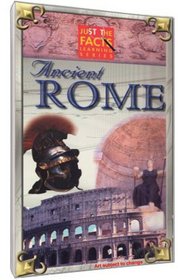| Actor: Just the Facts Director: Cerebellum Corporation Genres: Special Interests, Educational, Documentary Sub-Genres: Special Interests, Educational, History Studio: Cerebellum Corporation Format: DVD - Color DVD Release Date: 08/28/2007 Release Year: 2007 Run Time: 0hr 52min Screens: Color Number of Discs: 1 SwapaDVD Credits: 1 Total Copies: 0 Members Wishing: 1 MPAA Rating: NR (Not Rated) Languages: English |
Search - Just The Facts: Ancient Rome on DVD
  | Just The Facts Ancient Rome Actor: Just the Facts Director: Cerebellum Corporation Genres: Special Interests, Educational, Documentary NR 2007 0hr 52min ANCIENT ROME - DVD Movie |
Larger Image |
Movie DetailsSimilar Movies
|
Movie ReviewsA VERY quick overview D. Roberts | Battle Creek, Michigan United States | 09/20/2002 (4 out of 5 stars) "This is a ramming-speed video which attempts to cover the highlights of an empire that lasted over 1,200 years in a span of 45 minutes. Needless to say, a great deal gets left out. Even the epochs which the documentary does cover are lacking in crucial details. What it leaves out in detail it makes up for in scope. We are offered brief commentary on everything from the founding of Rome in 753 BC to its ultimate demise in 473 AD. Everything that happened over this period, such as the end of the Republic, the wars to expand the empire and the coming of Christianity, are all cited (however briefly).The work collaborates the efforts of 3 university professors from 3 different schools (Oxford, UCLA, Michigan). It is obvious that the video is geared much more towards persons who have little knowledge of Classical history, rather than those who have a general understanding but wish to learn more. That said, it still retains its moments of keen insights on the far & away Roman past.The biggest objection I have is to some of the speculation provided by David Potter of the university of Michigan. As he has in other documentaries on ancient Rome, Potter downplays the number of gladiators that were slain in the arena. Potter's dictum is that the best of the gladiators always (or almost always) got "off the hook" when they were subdued by their adversaries in the Collosseum. Hence, Potter argues, the number of gladiators slain in the sand over the centuries has been greatly exaggerated by popular conceptions and myth. This is a rather convoluted topic, one that must be engaged with caution.First off, it Potter is correct that the top-notch gladiators [called thus due to the fact that their weapon-of-choice was usually the short sword known as the "gladius"] did get the "best" matches available. By that I mean that they were no exposed to large infrantry mock-battles (the kind that Trajan favored so much). Instead, the odds would be relatively even, giving them the best opportunity to depart the arena unscathed. If they were good enough, they would also frequently be spared at the end of a bout, provided that they put on a good show. It was also not uncommon for the best of the best to either be granted or buy their own freedom (they bet on themselves). Frequently, ex-gladiators would become heads or instructors of gladiator schools, as is depicted in the movies SPARTACUS and GLADIATOR.However, even so, the carnage seen on the sands of the arena must have been appalling. The basic fallacy in Potter's premise is that all bouts between the elite gladiators NECESSARILY came down to one of them being subdued to the point that he could no longer fight. When this came about the crowd & the emperor would decide whether or not he lived or died. Common sense dictates that this could not have happened very often. Perhaps gladiators would begin with the objective of "subduing" their combatant with the efficacy of putting on a good show. In the heat of battle, however, all of that goes out the proverbial window. Think about it: if a gladiator is pitched in a locked combat where the other fellow matches him in skill and strength, will he nonetheless pass-up a chance to deliver a death blow, if given the opportunity? I think not. Hence, it would usually not come down to the famous picture we have of the victorious gladiator standing over his subdued adversary.Moreover, even when that did happen, the emperors who were the most enthusiastic about the gladiatorial games (Caligula, Claudius, Trajan, Commodus, etc) would not be apt to spare gladiator after gladiator - regardless of how good they are. Both the Romans and the emperors came to the arena to see one thing: blood. They did NOT come to see gladiators repeatedly get spared.Even in cases where the Romans did spare gladiators, it is not illogical to surmise that a good % of them had mortal injuries. I cannot conceive of a gladiator being able to fight again & again, yet be injured in his bouts so much that he cannot continue to fight for his life. The numbers simply do not add up in Potter's interpretations.If you're looking for a handy synopsis of the Roman empire, this is likely an ideal documentary to pick up. If you want a much longer but much more thorough study of the Romans, I would recommend ROME, POWER AND GLORY (ASIN: B00000JYWU @ Amazon.com)."
|




